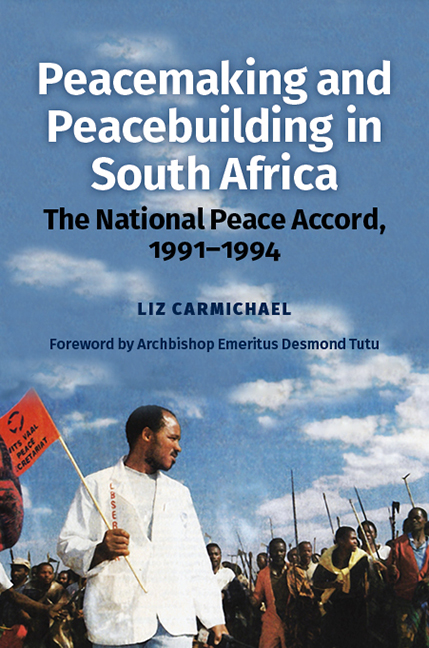Book contents
- Frontmatter
- Dedication
- Contents
- List of Illustrations
- List of Abbreviations
- Glossary
- Acknowledgements
- Note on Nomenclature
- Transition Timeline
- Foreword
- Introduction
- Part One Peacemaking, Peacebuilding, and the South African Conflict
- Part Two Peacemaking
- Part Three Peacebuilding
- Conclusion: Impact and Unfinished Business
- Bibliography
- Index
19 - The Police Board, Community Policing, and CPFs
Published online by Cambridge University Press: 08 October 2022
- Frontmatter
- Dedication
- Contents
- List of Illustrations
- List of Abbreviations
- Glossary
- Acknowledgements
- Note on Nomenclature
- Transition Timeline
- Foreword
- Introduction
- Part One Peacemaking, Peacebuilding, and the South African Conflict
- Part Two Peacemaking
- Part Three Peacebuilding
- Conclusion: Impact and Unfinished Business
- Bibliography
- Index
Summary
Introduction
Among its ‘General Provisions’ for the security forces, the National Peace Accord created a ‘Police Board’ consisting of police and public in equal numbers, ‘to consider and make recommendations to the Minister of Law and Order in regard to the policy relating to the training and efficient functioning of the police, with a view to reconcile the interests of the community with that of the police’ (NPA 3.3.3). It was a concrete expression of the philosophy of community policing, foreshadowing the use of such Boards in future policing structures. It brought together the top police officers and the country's leading minds on policing policy, in a creative and influential think-tank. Its civilian members were nominated by the NPC but it had no obligation to report to the NPC (in May 1992 the NPC suggested that it should, and in June 1993 the RPCs requested reports, which then began to flow and were widely disseminated). A personal link with the NPS was maintained through Peter Gastrow, the DP MP who sat on both bodies.
The ANC originally wanted the Board to have powers over police operations. It was, however, framed strictly as an advisory body to the Minister, with ‘no role in regard to the day to day functioning of the police’ (3.3.5). It was empowered ‘to do research’ and to call for representations from the public (3.3.4) and could make its recommendations public ‘in so far as it is essential in reconciling the interests of the community with that of the police’ (3.3.6). It had no power to enforce the implementation of its recommendations. These circumscribed powers and guarded language reflect the wariness with which the SAP in 1991 still regarded any intrusion by civilians in general, and the ANC in particular, into its operations. Mistrust was fully reciprocated on the ground; but the Board proved itself a significant element in a massive wave of change.
Police–community relations were woven into the fabric of the peace structures, particularly at local and regional levels. Some particular instances are highlighted here.
- Type
- Chapter
- Information
- Peacemaking and Peacebuilding in South AfricaThe National Peace Accord, 1991-1994, pp. 424 - 433Publisher: Boydell & BrewerPrint publication year: 2022



